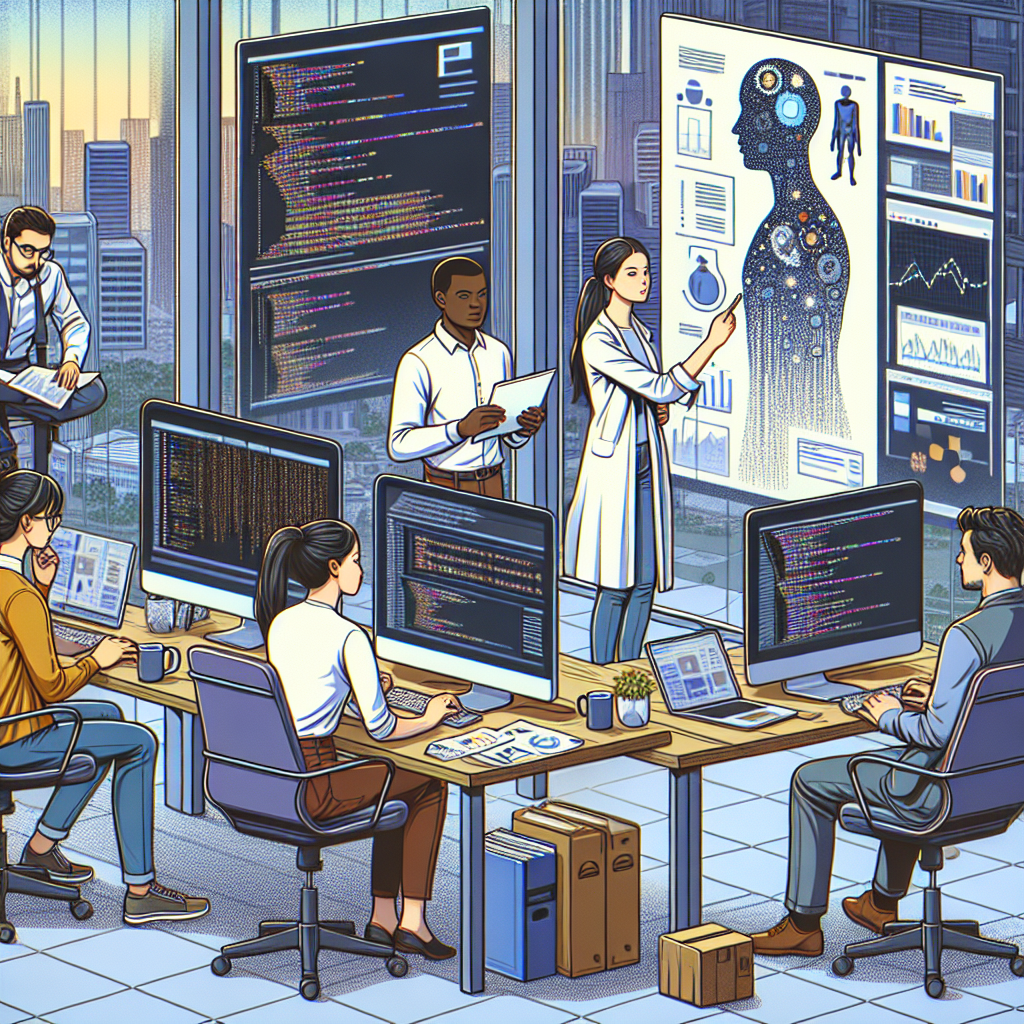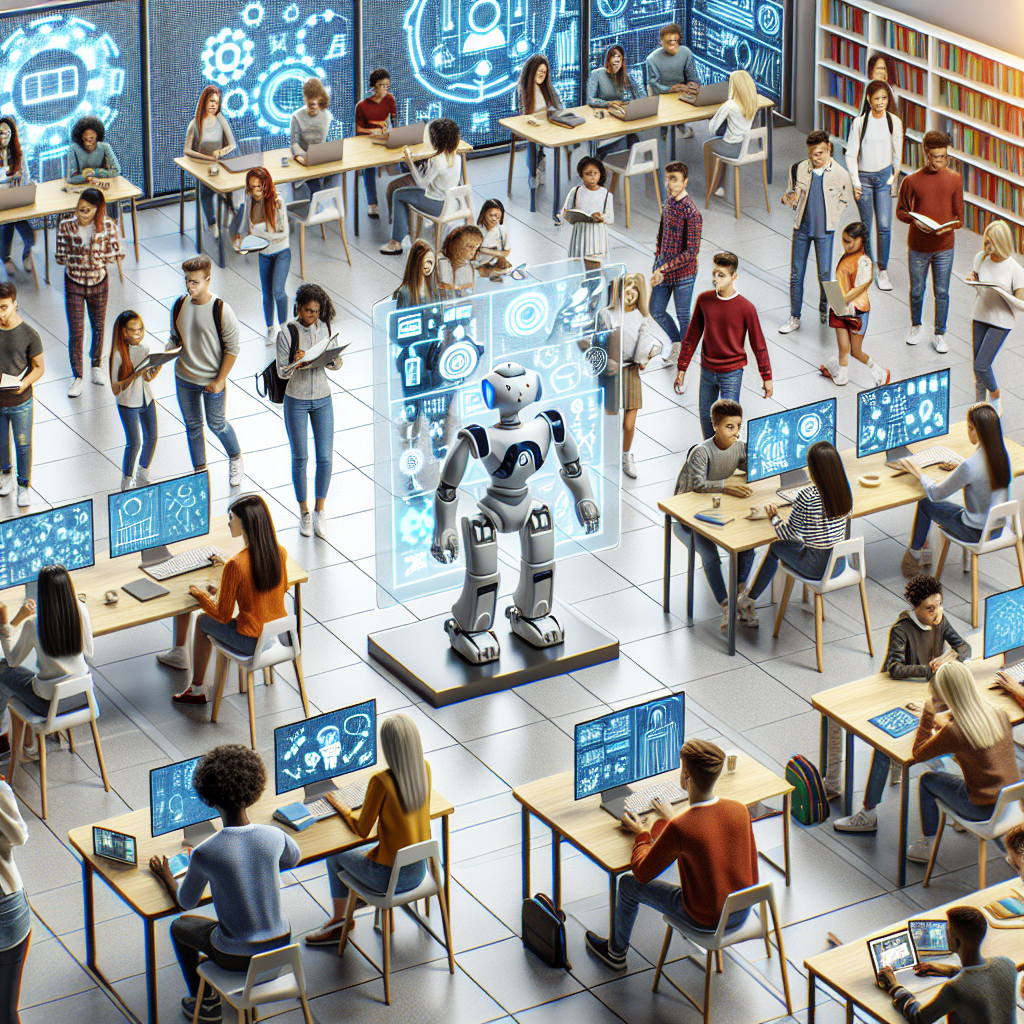Harness the Power of Artificial Intelligence: Discover What AI Engineers Do and How to Become One

Who is an AI Engineer? Unveiling the Role in Today’s Tech Landscape

Youre living in a fascinating era where technology is evolving faster than ever, and at the heart of this transformation are AI engineers. But who exactly are they? Simply put, AI engineers are the creative architects behind artificial intelligence applications.⭐ They play a critical role in designing, building, and managing AI systems tailored to enhance various industries, from healthcare and finance to education and beyond.
What Do AI Engineers Do?
Close your eyes for a moment and imagine a world where machines understand human emotions or predict your next purchase. AI engineers make that happen! Their tasks typically include:
- Designing AI Models: They create algorithms that can learn from data. Think of them as teachers, guiding AI systems to learn and improve continuously.⭐
- Data Management: AI engineers gather and preprocess data for training models. Its similar to chef preparing their ingredients before starting to cook!
- Implementing AI Solutions: Whether its a chatbot for customer service or a recommendation engine for an online store, AI engineers deploy solutions that make life easier for businesses and consumers alike.⭐
- Continuous Learning: They must keep up-to-date with the latest trends and advancements in AI. Just as a doctor needs to read the latest studies, AI engineers stay informed to adapt their skills.
The Impact of AI Engineers: Real-Life Examples
Imagine Sarah, a school teacher who struggled with managing her classroom efficiently. With the introduction of AI for education, an AI engineer optimized a learning management system that analyzes student performance. As a result, Sarah can now tailor lessons to meet individual needs, leading to improved engagement and performance in her class! ✨
Another example is John, a small business owner. He found it challenging to market his products effectively and tempt customers to revisit his store. With the development of an AI for educators tool that predicts purchasing behavior, John can now target promotions much better and sees his sales skyrocket!
Becoming an AI Engineer: The Path Ahead
Feeling inspired to dive into this exciting field? Heres how you can start your journey to become an AI engineer:
- Education - A bachelor’s degree in computer science or a related field is a solid foundation.
- Learn Relevant Skills - Focus on mastering programming languages like Python, and familiarize yourself with machine learning frameworks such as TensorFlow or PyTorch.
- Gain Practical Experience - Internships or projects can provide hands-on experience. Diving into open-source AI projects or participating in hackathons can boost your resume!
- Stay Updated - Follow industry trends and advancements. Resources such as online courses, journals, and webinars are valuable.
A report from the World Economic Forum indicates that jobs related to AI are expected to grow significantly, with a projected increase of over 20% in the next five years! ⭐ If youre thinking of a lucrative job, consider that the average salary for an AI engineer can range between 50,000 and 120,000 EUR annually, depending on experience and location.
Exploring the Future: Artificial Intelligence Development
But the journey doesn’t end there! Exploring artificial intelligence development unveils numerous trends that aspiring AI engineers can leverage. For instance, generative AI is revolutionizing education by allowing teachers to create personalized learning experiences for their students.
Real Client Stories: How We Help
At Artivale.com, we’ve helped countless clients navigate through their IT challenges. One corporate client approached us with issues in their IT infrastructure causing weekly downtime, which meant lost revenue. We analyzed their systems and proposed a comprehensive solution that optimized their network design and introduced robust security measures. The outcome? Their system downtime reduced by over 75%, significantly improving their operational efficiency.⭐
Clients like these inspire us every day, showing how effective AI engineers can be in optimizing processes and driving innovation in various industries.
Expert Advice for Aspiring AI Engineers
As you journey towards becoming an AI engineer, remember these nuggets of advice:
- Keep Experimenting: Use free resources online to develop your AI projects and share them on platforms like GitHub.
- Network: Connect with current AI professionals to gain insights and possible mentorship.
- Stay Curious: The field of AI is ever-evolving. Constantly seek new knowledge!
Dont miss out on this opportunity to make your mark in technology. If you’re looking to improve your IT infrastructure or need guidance on leveraging AI in your business, contact us at [email protected] or visit artivale.com to learn about how our team can support you every step of the way!
Frequently Asked Questions about AI Engineers
-
What is the primary role of an AI engineer?
They design, build, and implement AI systems across various industries. -
How can I become an AI engineer?
Start with a degree in computer science, learn programming, and gain hands-on experience. -
What skills are crucial for AI engineers?
Key skills include programming, data analytics, and understanding machine learning algorithms. -
What is the average salary for an AI engineer?
Annual salaries can range from 50,000 to 120,000 EUR depending on experience. -
Can AI help in education?
Yes, AI tools can personalize learning experiences for students. -
What is generative AI?
Generative AI refers to algorithms that can create new content, such as text or images, based on learned data. -
Is a background in math necessary?
Yes, a solid understanding of statistics and linear algebra is helpful. -
Are there certifications for AI engineering?
Yes, various online platforms offer certifications that can enhance your credentials. -
How can AI benefit businesses?
AI can optimize operations, enhance customer service, and drive sales. -
What resources can I use to learn AI?
Online platforms like Coursera, edX, and Udacity offer courses for all levels.
How to Become an AI Engineer: Responsibilities, Skills, and Salary in the Emerging AI Industry

Are you passionate about technology and machine learning? If so, the field of AI engineering might be your next big adventure! With the world embracing artificial intelligence, now is a fantastic time to dive into this exciting career path. But how does one become an AI engineer? Let’s explore the responsibilities, essential skills, and salary expectations of this in-demand profession.⭐
Understanding the Responsibilities of AI Engineers
An AI engineer wears many hats. Here’s a breakdown of their core responsibilities:
- Designing AI Models: AI engineers create and customize algorithms that allow machines to learn from data. It’s like teaching a toddler to recognize shapes! ⭐
- Data Preprocessing: They manage and prepare the data used for training AI systems. Properly cleaned and organized data is key to successful AI models!
- Implementing Machine Learning Algorithms: AI engineers apply various algorithms for specific AI tasks, from neural networks to decision trees.
- Troubleshooting AI Systems: They monitor systems for performance and accuracy, making adjustments as needed. Just like a car mechanic fine-tuning parts for a smoother ride.
- Collaboration: AI engineers often work with data scientists, software developers, and project managers to integrate AI solutions seamlessly within an organizations infrastructure.
Essential Skills for Aspiring AI Engineers
To thrive as an AI engineer, certain skills are paramount. Here’s a list to guide your learning:
- Programming Languages: Proficiency in languages like Python and Java is essential for developing and implementing AI models.
- Understanding of Algorithms: Knowledge of machine learning algorithms and statistical models is vital. You’ll need to know which tool to use and when!
- Data Analysis: Familiarity with data manipulation libraries like Pandas and NumPy can help you extract insights from data sets.
- Deep Learning Frameworks: Skills in TensorFlow, Keras, or PyTorch are crucial for building advanced AI systems.
- Cloud Computing: Understanding cloud platforms (like AWS or Azure) can significantly aid in deploying AI solutions efficiently.
Salary Expectations in the AI Industry
As with any profession, understanding potential earnings can help you make informed decisions. The salary of an AI engineer can vary based on factors such as experience, location, and specific job responsibilities. Here are some key points:
- The average salary for an entry-level AI engineer typically starts at around 50,000 EUR per year.
- With experience ranging from 3 to 5 years, salaries can jump to between 70,000 and 90,000 EUR annually.
- Senior AI engineers and those in managerial positions can command upwards of 120,000 EUR annually, depending on the industry and workload.
The demand for AI engineers is skyrocketing, and a report by Gartner indicates that AI projects are expected to increase by more than 30% in the next few years! ⭐ This means job security and a wealth of opportunities for those who equip themselves with the right skills.
How to Get Started?
If you’re ready to embark on this journey, here are some steps you can take today:
- Enroll in Relevant Courses: Online platforms like Coursera and edX offer courses specific to artificial intelligence development.
- Build a Portfolio: Start small or engage in freelance projects to showcase your skills. Your portfolio speaks volumes to potential employers!
- Network: Join AI communities, attend conferences, and connect with other professionals to learn from their experiences.
- Stay Current: Read research papers and articles to keep up with the latest trends in AI.
In Conclusion...
Becoming an AI engineer is not just a career choice; its a chance to innovate and shape the future. Whether you’re starting your education or switching fields, the world of AI is open for exploration! If you need guidance or support in your AI journey or are seeking innovative IT solutions for your business, reach out to us at [email protected] or visit our website, artivale.com. Our professional specialists are here to guide you every step of the way!⭐
Frequently Asked Questions about Becoming an AI Engineer
-
What education is required to become an AI engineer?
Typically, a bachelor’s degree in computer science or a related field is needed. -
Are certifications important?
Certifications can provide deeper knowledge and improve employability. -
What programming languages should I learn?
Python and Java are essential, along with familiarity with R. -
What types of projects do AI engineers work on?
They work on machine learning applications, chatbot development, and more. -
How can I gain experience as an AI engineer?
Participate in internships, freelance projects, and open-source contributions. -
What industries need AI engineers?
Industries such as healthcare, finance, education, and entertainment require AI expertise. -
Can I work remotely as an AI engineer?
Yes, many AI engineering jobs offer remote work options. -
What are the growth opportunities in AI?
Career paths can lead to senior engineer, team leader, or AI project manager roles. -
Are there AI communities I can join?
Yes, numerous forums, meetups, and online communities are dedicated to AI and machine learning. -
What is the future of AI engineering?
The field is expected to grow rapidly as businesses increasingly adopt AI technologies.
What is Artificial Intelligence Development? Exploring Trends and Opportunities for Aspiring AI Engineers

Artificial Intelligence (AI) development is one of the most groundbreaking fields of technology today. It encompasses the creation of systems and algorithms that can perform tasks typically requiring human intellect. But what exactly does this mean, and how can aspiring AI engineers capitalize on the trends and opportunities emerging in this vibrant domain? Let’s dive in! ⭐
Understanding Artificial Intelligence Development
AI development revolves around creating programs that can mimic human cognition. This includes learning, reasoning, problem-solving, perception, and even language understanding. Here’s a quick look at the essential components:
- Machine Learning (ML): A subset of AI where systems learn from data to improve their performance on tasks without being explicitly programmed.
- Deep Learning: A branch of ML that uses neural networks with many layers to analyze various factors in data, enabling advanced capabilities such as image and voice recognition.
- Natural Language Processing (NLP): This enables machines to understand and respond to human language, making interaction with technology more intuitive.
- Robotic Process Automation (RPA): Automating routine tasks to improve efficiency and reduce the chance of human error in various sectors.
Current Trends in AI Development
The field of AI is rapidly evolving, and staying updated with current trends is crucial for aspiring AI engineers. Here are a few trends driving the future of AI:
- Generative AI: Tools like GPT-3 have gained massive attention for their ability to create original content, from articles to music. This technology is already making waves in industries like entertainment and marketing.
- AI in Education: AI for education is revolutionizing how students learn. Intelligent tutoring systems can personalize learning experiences to meet individual student needs, making education more accessible.
- Explainable AI (XAI): As AI systems become more complex, the need for transparency and understandability grows. XAI helps stakeholders understand how AI systems make decisions, which is crucial for trust in AI technologies.
- AI Ethics and Regulations: With great power comes great responsibility. As AI technology expands, there is a rising focus on ethical AI development and the implementation of regulations to ensure fairness and accountability.
Opportunities for Aspiring AI Engineers
The demand for skilled professionals in AI is surging. According to a recent report by the World Economic Forum, over 85 million jobs will be created in the AI sector by 2025. This means there’s a wealth of opportunities for aspiring AI engineers! Here’s how you can seize these opportunities:
- Start Learning: Online courses, degrees, and boot camps in AI and machine learning can equip you with the necessary skills. Platforms like Coursera, Udacity, and edX offer specialized programs to kick-start your journey.
- Engage in Projects: Hands-on experience is invaluable. Contribute to open-source AI projects or create your projects to enhance your portfolio and showcase your capabilities.⭐
- Networking: Attend AI conferences, webinars, and workshops to connect with industry professionals. Joining platforms like LinkedIn can help you gain insights into current trends and job opportunities.
- Internships: Look for internships or entry-level jobs that allow you to work on real-world AI applications. This experience can be a game-changer for your career.
Real-World Examples: AI Impact Across Industries
AI development is transforming industries around the globe. For instance, in healthcare, AI algorithms analyze patient data to provide more accurate diagnoses and suggest personalized treatment plans. This has led to improved patient outcomes and reduced costs.
In the finance sector, AI systems are used for fraud detection, credit scoring, and algorithmic trading. Banks employ machine learning models to analyze transaction patterns, providing security against fraud. This efficient processing capability saves time and resources, making it a compelling opportunity for aspiring AI engineers to explore.
Preparing for the Future of AI
As you ponder your place in the AI landscape, remember it’s essential to remain adaptable. The technology evolves quickly, and new tools and frameworks emerge regularly. Embrace continuous learning and stay curious. One of the most thriving sectors is AI for education, and as an AI engineer, you can have a direct influence on developing solutions that enhance learning experiences—not just for students but for educators as well.
Take the Next Step Today!
The world of artificial intelligence development is rich with opportunities waiting to be explored. By understanding the trends, honing your skills, and seizing new opportunities, you can kickstart a rewarding career as an AI engineer. If you’re looking for support on your journey, feel free to reach out to us at [email protected] or visit artivale.com. Our expert team is ready to guide you through innovative IT solutions and assist you in navigating the vibrant AI landscape! ⭐
Frequently Asked Questions about AI Development
-
What is the main goal of AI development?
The aim is to create systems that can perform tasks that typically require human intelligence. -
What are the key components of AI?
Key components include machine learning, deep learning, and natural language processing. -
What industries benefit most from AI?
Industries such as healthcare, finance, education, and entertainment are significantly enhanced by AI technologies. -
How can I get started in AI development?
Start learning through online courses, engage in projects, and seek internships. -
Is programming knowledge required for AI development?
Yes, proficiency in programming languages like Python is essential. -
What are current trends in AI?
Trends include generative AI, explainable AI, and the growing importance of ethics in AI development. -
What role does data play in AI development?
Data is foundational for training AI models and algorithms. -
Are there any ethical considerations in AI?
Yes, there is a strong focus on ensuring fair and accountable AI practices. -
What is generative AI?
Generative AI refers to systems that can create content based on learned patterns. -
How fast is the AI job market growing?
The job market is projected to expand by over 30% in the next few years, creating numerous opportunities.
Submit your details in the form and our team will personally get in touch with you within the next business day to discuss your needs
